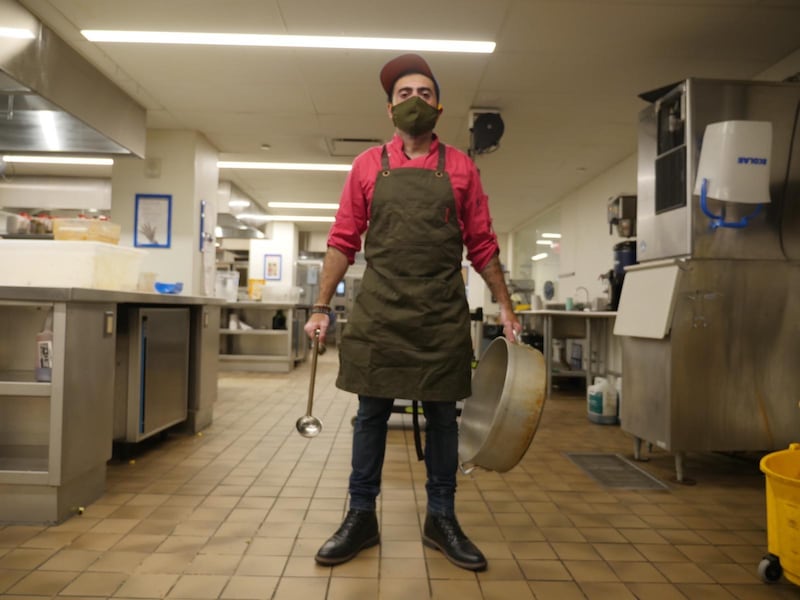It's barely daybreak and Migrant Kitchen NYC is already in full swing. To the uninitiated, it looks like chaos. To the company’s co-founder, Nasser Jaber, who is showing me the premises through a Zoom call, it is running like clockwork.
Trolleys with stacked trays of chimichurri chicken are being rolled in and out of one walk-in oven. A second is loaded with pans of heaped freekeh. Vegetables are being diced in one section. Elsewhere, bulgur and onions are being rolled with chorizo into kibbeh.
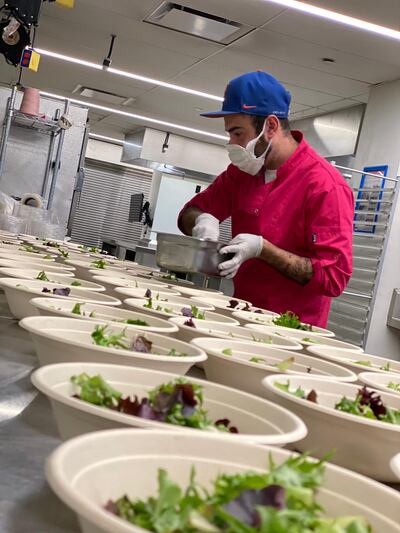
On long metallic tables in the next room, individual containers are being laid out to be packed with equal portions of whatever is on the menu that day. The dishes usually fuse Middle Eastern and Latin American flavours. Think mousakhan with fried chicken, salmon sprinkled with zaatar and the famous chorizo kibbeh.
A chaotic order rules this kitchen in Queens, and there are four other branches just like it scattered around New York City, all working at the necessary breakneck speed to ensure the day’s 6,000 meals are delivered promptly.
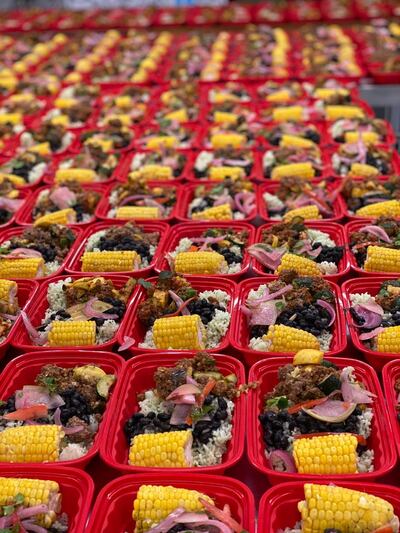
The meals – which are halal-certified and contain no nuts – are given for free to front-line hospitals, homeless shelters and senior citizens centres around the city, as well as public housing complexes and families infected with the coronavirus. In the city’s fight against the pandemic, Migrant Kitchen NYC is a necessary source of fuel.
By 8am, the delivery vans – which have Black Lives Matter and Palestinian Lives Matter decals on them – have already pulled up at the nondescript Queens location and are being loaded with boxes upon boxes of meals. Meanwhile, a shipping container set on the side of the road is being emptied of locally sourced ingredients that will be used for the next day's dishes.
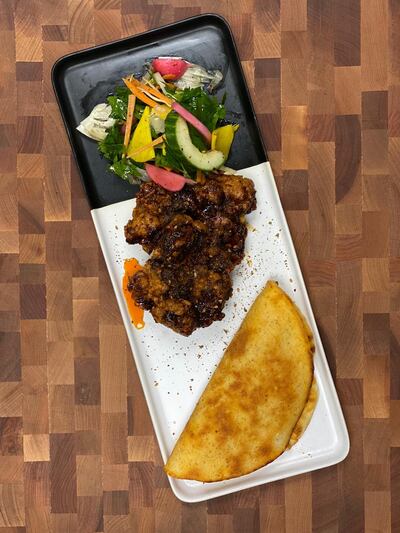
A 24-hour operation fuelled by migrant workers and refugees
“It is a 24-hour operation," Jaber, who was born in Ramallah, explains. “Everything is accounted for. Every meal, every delivery and consignment. Sometimes we have an excess output of food. But instead of just giving it away or letting it go to waste, we look at where the food is needed. This past week, we had around 700 extra meals a day so we started distributing them to domestic abuse shelters in New Jersey.”
And it’s not only where the meals are going that creates social impact. Migrant workers and refugees form the backbone of the company, earning up to $25 (Dh91) an hour working in the kitchen as well as on the delivery circuit. Many of them are undocumented and are protected by a law firm that the company donates to.
Empowering migrant workers was the essence of the kitchen’s mission when Jaber founded the company in October 2019 with its chief executive Daniel Dorado, a chef with more than 20 years of experience. Jaber calls him his mentor.
"I met Dorado while working as a waiter at [New York Lebanese restaurant] Ilili," Jaber says. "He really exposed me to a new way of thinking about food. It was a true Fifth Avenue two-star New York Times experience, which I had never had before. They were serving stuff I'd never seen. Dorado was making all kinds of interesting dishes. From kibbeh nayyeh with black truffles to gluten-free mujaddara croquet … just mind-blowing."
Dorado’s approach to crafting dishes was carried forward to Migrant Kitchen NYC. It was essentially established as a catering company that taught migrant workers how to cook in a commercial kitchen, while giving them the chance to add their own twist to recipes.
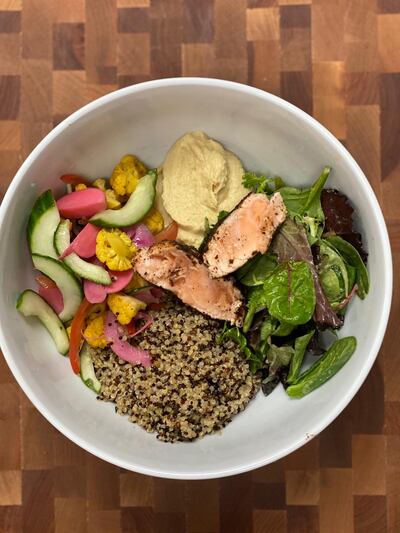
“We were bending Syrian flavours with Mexican and Indian ones. Everything was going really well for a few months and we were catering to more than two dozen WeWork [a shared workspace company] locations around the city,” Jaber says. “And then, the coronavirus pandemic took hold.”
Post-pandemic: halal meals for Muslims in need
As a citywide shutdown was imposed on March 14, the kitchen found itself with more than 1,000 meals in its fridges and no clients.
Rather than throwing them away, Jaber says they decided to donate them to shelters around the city.
(2/2) of @NasJab ‘s video, from The Migrant Kitchen in NYC 🇺🇸 #SocialGastronomy #SGMsolidaritychain #ConnectLocal #InspireGlobal pic.twitter.com/ksOMTdr3Rf
— Social Gastronomy Movement (@thesgmovement) April 6, 2020
“A friend of mine who works in a hospital’s Covid unit calls me and says the staff don’t know where to get food as restaurants around the city were closed. So we sent them some food. And then we started delivering meals to another hospital and then another. And, all of a sudden, we’re feeding four of the most Covid-hit hospitals.”
It didn’t take long for Jaber to realise how necessary it was to continue the initiative. A GoFundMe page was launched to keep efforts rolling and more than $125,000 was raised to feed front-line healthcare workers around the city.
“We then started distributing halal meals to Muslim workers around the city and those living under the poverty line who were being gravely affected by the pandemic. Those whose relatives died from the virus and who didn’t have access to hospitals,” Jaber says.
The day Migrant Kitchen got a boost, Jaber's father in Palestine died
Soon after, the city learnt of the initiative and approached the company to help boost their efforts.
The contract increased the kitchen’s distribution network from 450 meals a week to thousands a day. Migrant Kitchen NYC went from being a catering company to, in Jaber's words, "one of the largest disaster relief operations in the US".
Thank you to one of the great restaurants doing amazing things in #NYC, The Migrant Kitchen. They continue to support #FrontLineHeroes. #COVID19 #HeroesOfCovid19
— Food Service Exchange (@FSXMarket) April 24, 2020
For more inspiration: https://t.co/mwt6beLFbZ
(Photo: Migrant Kitchen) pic.twitter.com/t5YpKxat0A
Jaber remembers the day well. “May 7,” he says. “That morning, a 3,000-word article on the kitchen came out in the press. At 1pm, we get our big federal contract, which changed our lives for ever. We went from being a mediocre company to a multi-million dollar company within an hour. Then, at 2pm, my dad dies.
“I’m in the middle of the kitchen, I get a call from Palestine, my niece is crying and I’m already overwhelmed from everything that had happened that day, and all of a sudden I have to coordinate a Zoom call to bury my dad,” Jaber says.
While his father had been sick and bedridden for eight years, the news still came as an unforeseen shock.
Caught between the bad news and the stupor of a life-changing moment, Jaber didn’t quite have the space to absorb either. In a way, he says he still hasn’t.
Bringing the know-how to the Middle East
At first glance, Jaber's story of success may seem like one that took place overnight. But the reality is very different.
The project follows tough lessons learnt in the restaurant industry, and a handful of failed ventures and setbacks. “But all those experiences gave me the insight necessary to set up Migrant Kitchen NYC. From the know-how of logistics to contacts made from working for 15 years in the industry.”
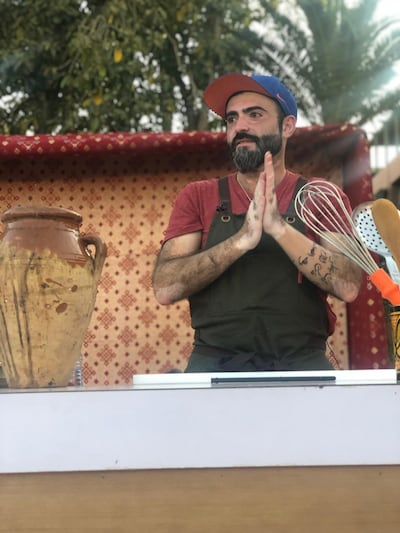
Jaber is now looking to bring that know-how home to the Middle East.
He is already running food distribution operations in Jerusalem, specifically to the hospitals that were affected by the Trump administration's $25 million aid cut in 2018. Jaber has now set up operations in Beirut and is looking to expand to serve Yemen as well as refugee camps across the Levant.
He says to really do all that would require the backing of a regional government. “We could raise the money from the public, but it’s not as efficient.
"The way I see this company growing is to become a large food supplier in disaster relief,” he says. “I want to build aerofarms [vertical farms] in Gaza to establish food security. I want to go and be able to set up sustainable farming in Syria, sustainable food capacity in Yemen.
"I want to feed every hungry Middle Easterner regardless of their ethnic or religious background,” he says.
The statement may seem ambitious, but Jaber has a habit of making the far-fetched happen. He has been called the 'Palestinian Anthony Bourdain', but his life looked very different a year ago.
On being homeless and in debt
“I was homeless, sleeping on friends’ couches. I was more than $100,000 in debt. I was depressed and, along with my bipolar disorder, I was in a really bad place. I had to take care of my family back in Palestine, pay for my father’s medical bills. I didn’t have more than $20 to spend every week.”
A lion’s share of this debt amassed because of Mazeish, a Palestinian-South American fusion restaurant that Jaber opened with two friends in 2015. Up until that point, Jaber had been waiting tables for close to a decade at a number of places around New York City, from Dallas Barbecue to Le Pain Quotidien.
Mazeish was his way of breaking into the food scene as an entrepreneur.
He opened the restaurant in a location in the Lower East Side that had been home to some top names in the New York food scene. Celebrity chef Eddie Huang had a restaurant in the space before Pok Pok moved in. The latter is a popular Thai restaurant that won the coveted James Beard Award; it moved its operation to Brooklyn.
However, not long after opening Mazeish, Jaber found out why others were so eager to move out of the location. It didn't work: although well received and critically praised, the restaurant was losing money and was unable to break even.
But it was here that Jaber found out how food and activism could blend together. In 2017, months away from closing down the venue, he began hosting Displaced Kitchens, which gave a platform for refugees to cook, share their stories and earn money.
Seats at the dinner would be ticketed at an average of $100, with the proceeds going to the refugees. This experience then inspired Jaber to set up Komeeda, an e-commerce platform for restaurants and chefs that helped carry Displaced Kitchens to other cities and venues, including the South by Southwest circuit, an annual conglomeration of music festivals and conferences in Austin, Texas.
Bridging the gap: Displaced Kitchens is helping New Yorkers and refugees connect. pic.twitter.com/c2bUV60IYH
— AJ+ (@ajplus) October 13, 2017
“At one point, we were hosting three dinners a city every night in more than 10 cities,” Jaber says. “We fed more than 5,000 people and helped 200 families get out of poverty.”
However, owing to elements Jaber says were separate from the concept, Komeeda failed, too, and he soon found himself broke and homeless. “I was engaged to a beautiful woman who I wanted to marry,” he says. “But I felt like I couldn’t provide, and broke it off. Not to say she wasn’t ready to stand by me, but the financial stress put a lot of burden on the relationship.”
The Displaced Kitchens cookbook is a great way to help refugees in NYC. Great food too; I know, i've tried it! https://t.co/xdFD1F1LKU pic.twitter.com/zDr6GozB3D
— John Butler (@ButlerJohnW) October 3, 2017
Jaber says he felt like a failure and kept his financial distress a secret from many of his close friends. His parents were asking him why he had gone to the US in the first place. “I came to the US two weeks before 9/11. I was 17 and filled with hopes and dreams," Jaber recalls.
There has been no shortage of trials in the 19 years he has been living in the US, and his stint with homelessness felt like rock bottom. But now, he's surely reached a new pinnacle, and is helping others in the process.
"I had lost all hope, I wanted to end it. Then Dorado came and he convinced me to start the kitchen with him. It was a way for me to get back on my feet," he says, adding that he wants to keep paying it forward. His aim is to both be successful and make an impact, one serving of chorizo kibbeh at a time.
